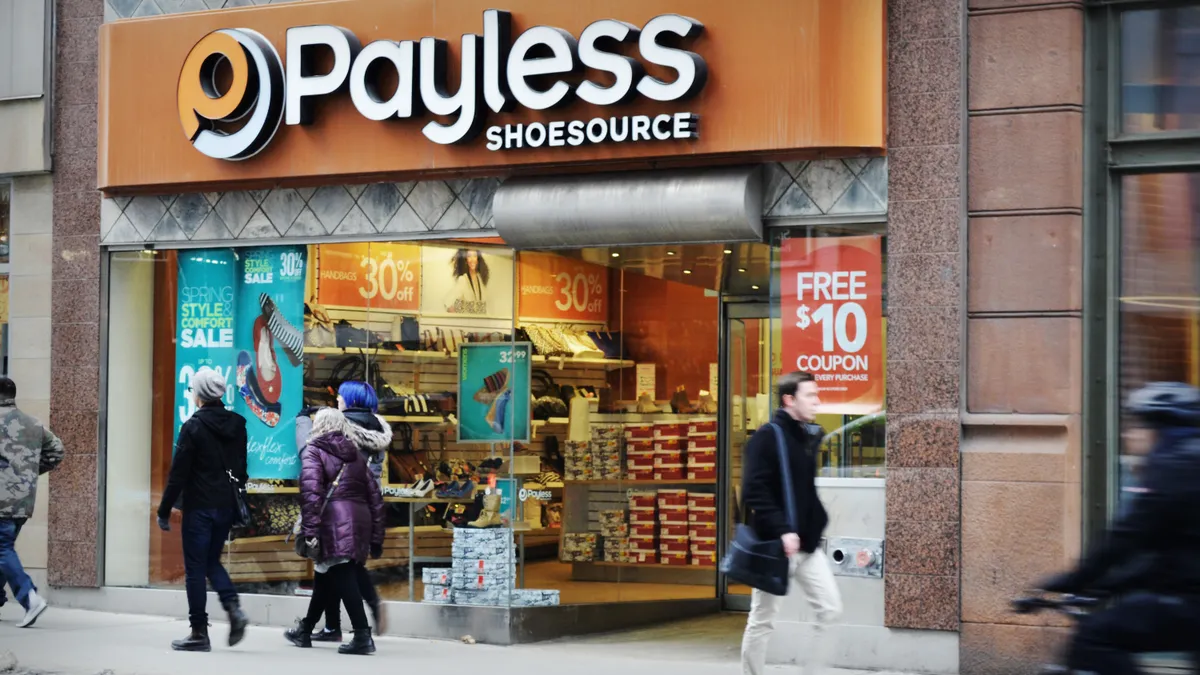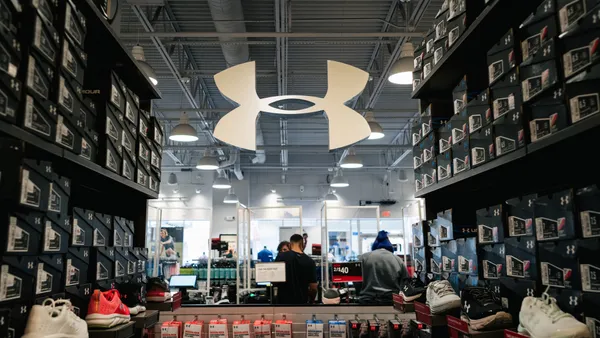Dive Brief:
-
Payless ShoeSource, which filed for bankruptcy on Monday for the second time in less than two years, won the authority it sought from the U.S. Bankruptcy Court for the Eastern District of Missouri to pay wages, salaries, expenses and other obligations to its store and other employees, the company said in a press release Wednesday. The retailer had expressed a need to pay out more than the bankruptcy code's $12,850 compensation and benefit cap, in order to keep its business running as it winds down its operations in North America, according to court documents filed Tuesday.
-
The company said that it employs about 13,700 workers in the U.S., Puerto Rico, the U.S. Virgin Islands and Guam and another 2,400 or so in Canada, including about 5,400 who work full-time and 10,800 part-time, mostly in stores. The retailer estimates that U.S. wages will come to $9.4 million and Canadian wages will reach $1.6 million, according to the filing.
-
The retailer also detailed financial obligations like workers compensation, performance bonuses and others, some dictated by law and others a matter of company policy. Among the obligations to workers the company isn't seeking to meet, however, is about $1.3 million in unpaid severance, out of about $3.9 million total for the 2018 fiscal year, according to the filing.
Dive Insight:
Payless operates about 3,400 stores in more than 40 countries, and, with its back against the wall under this second bankruptcy, it's preparing to liquidate a whopping 2,500 of them.
At a time of high employment, the retailer appears worried about keeping workers, so asked the court for some leeway to offer the level of wages and benefits that might entice them to stick around to the bitter end. Retail employment in January was down by 15,100 jobs unadjusted year over year, according to a report from National Retail Federation emailed to Retail Dive. That excludes automobile dealers, gasoline stations and restaurants, and came as the U.S. added 304,000 jobs overall since December, according to Labor Department statistics cited by NRF.
If Payless is to get the most out of its liquidation, it can't afford to lose the workers that it has trained and hired, the company said in its filing. "To minimize the personal hardship that the Employees would suffer if employee obligations are not paid when due or as expected, the Debtors seek authority to pay and honor certain prepetition claims relating to, among other things, wages, salaries, expense reimbursements," according to the filing, which later added, "The loss of health care coverage will result in considerable anxiety for Employees (and likely attrition) at a time when the Debtors need such Employees to perform their jobs at peak efficiency. Additionally, as set forth above, Employee attrition would cause the Debtors to incur additional expenses to find appropriate and experienced replacements, severely disrupting the Debtors' operations at this critical juncture."
The extent of the wind-down is impressive in light of the company's restructuring following its previous Chapter 11 filing. In 2017 Payless shuttered some 900 stores, which seemed like a lot at the time and was double its original plans, and weeded out layers of corporate management to cut costs, but that now seems insufficient. At the end of the road, the retailer is closing a massive number — nearly half of what Coresight Research recently estimated the U.S. would see this year — a footprint that contributed to its demise.
"The challenges facing retailers today are well documented, and unfortunately Payless emerged from its prior reorganization ill-equipped to survive in today's retail environment," Stephen Marotta, appointed last month as the company's chief restructuring officer, said in a statement. "The prior proceedings left the Company with too much remaining debt, too large a store footprint and a yet-to-be realized systems and corporate overhead structure consolidation. As a consequence, despite our substantial efforts, we were ultimately unable to operate the North American retail and e-commerce operations on a sustainable basis."
The retailer also received authorization from the court to honor customer gift cards and store credit until March 11, and to allow until March 1 returns and exchanges of "applicable non-final sale purchases" made before Feb. 17.














